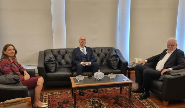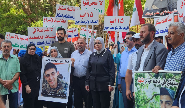
On February 27, 1994, Lebanon's societal taboos faded away. The explosion of Saydet al-Najat Church in Zouk shattered the equilibrium of reason and comprehension, leaving Christians engulfed in escalating fear and denial.
For some Lebanese, the explosion of Saydet al-Najat Church was perceived as a crime perpetrated by the Lebanese Forces (LF), based on the indictment of the investigation at that time. However, for the majority, particularly following Samir Geagea's acquittal in the church case, it came to be seen as one among numerous intelligence-driven fabrications during the Syrian occupation period. These fabrications resulted in internal fragmentation within Lebanon and fostered mistrust among its various components.
The problem in this context is that the Lebanese structure hindered the thorough investigation of the church explosion, culminating in Samir Geagea's acquittal without convicting the actual perpetrator. If the Lebanese Forces did not do it, neither directly nor indirectly, except for the government's aim to incarcerate Samir Geagea, what efforts were exerted to unveil the actual truth after this crime? Do the martyrs not deserve justice for what happened while they were praying in the church?
This issue brings us back to a bigger matter which is reconciliation with oneself and with the past. Lebanon has not witnessed any true reconciliation since the 1958 revolution. We haven’t yet engaged in any meaningful introspection to discern the righteous from the wrongful in our history. What's even worse is our failure to uncover the truth behind any of the crimes committed in Lebanon. Can we imagine that the assassination of President René Moawad went without any investigation or trial, despite occurring before the church explosion in Zouk? Can we imagine that the assassination of Ramzi Irani, a partisan of the Lebanese Forces, occurred in broad daylight without yielding any conclusive investigation results? All that remains are the papers forgotten in the drawer, leaving the grieving family without answers regarding who ended their son’s life.
Numerous politically motivated crimes, spanning from assassinations to homicides, have occurred in Lebanon. The most recent was the assassination of journalist and writer Lokman Slim. We haven’t witnessed any chivalry from the judiciary or investigators in uncovering the truth, as was evident in the explosion of Saydet al-Najat Church in 1994. This topic raises many questions and unknowingly provides answers because the only thoroughly investigated case in Lebanon is that of Saydet al-Najat, even though the accused, Samir Geagea, was acquitted.
The problem is that certain well-known individuals who were really involved have now gained immunity and hold positions as MPs or in ministries. We fear that they might also reach the presidency.
Read more



Comments